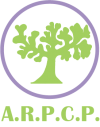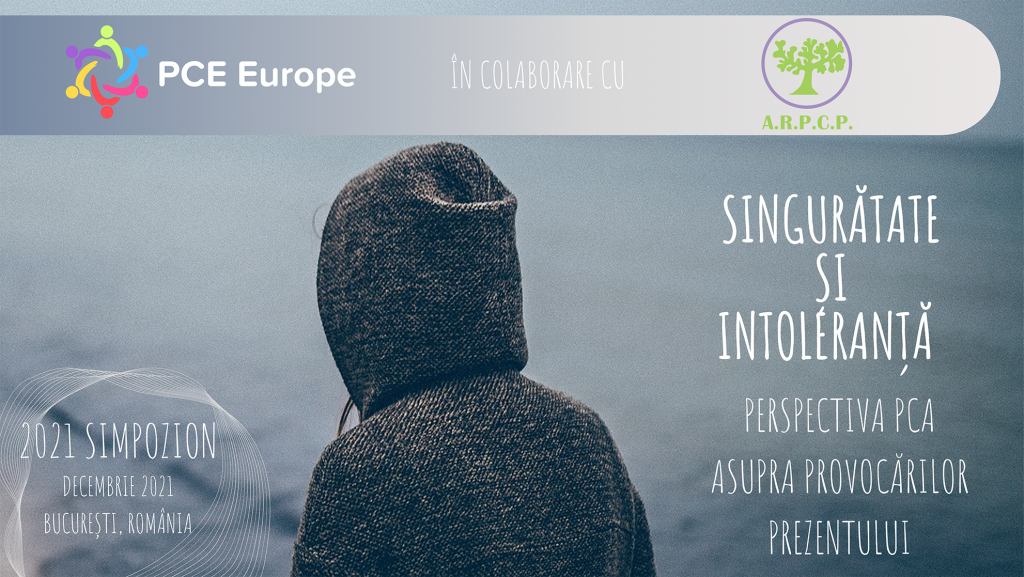
Programul evenimentului
| Simpozion | ||||
| Vineri, 3 Decembrie | ||||
| Ora | Activitatea | Autor | Titlul | Camera |
| 15:00 – 16.00 EET | Ceremonia de deschidere | Ceremonia de deschidere | Zoom 1 | |
| 16.00 – 18.00 EET | Keynote | Lore Korbei | „Suntem un singur eveniment?! Procesul de la „eu” către „noi” și viceversa” | Zoom 1 |
| 18.00 – 18.30 EET | Coffee-Break | Coffee-Break | Coffee-Break | Zoom 1 |
| 18.30 – 19.30 EET | Aniversare ARPCP – 20 de ani | Aniversare ARPCP – 20 de ani | Aniversare ARPCP – 20 de ani | Zoom 1 |
| 19.30 – 21.30 EET | Encounter Group | Leonore Langner, Arina Dogaru | PCE Encounter Group, pe tema Simpozionului
|
Zoom 1 |
| Sâmbătă, 4 Decembrie | ||||
| Ora | Activitatea | Autor | Titlul | încăperea |
| 10.00 – 12.00 EET | Keynote | Sheila Haugh | „Suntem o planetă mică, dar cu o mare speranță” | Zoom 1 |
| 12.00 – 12.30 EET | Coffee – Break | Coffee – Break | Coffee – Break | Coffee – Break |
| 12.30 – 14.00 EET | Keynote | Mick Cooper | “Consiliere centrată pe persoană pentru tinerii din școli: rezultatele unui studiu controlat pe un eșantion reprezentativ de populație aleatorie” | Zoom 1 |
| 14.00 – 15.00 EET | Pauză de masă | Pauză de masă | Pauză de masă | Pauză de masă |
| Ora | Activitatea | Autor | Titlul | încăperea |
| 15.00 -16.30 EET | Workshop | Dion Van Werde | „Pre-terapia“, o cale centrată pe persoană de a realiza reconectarea | Zoom 1 |
| 16.30 – 17.00
EET |
Coffee – Break | Coffee – Break | Coffee – Break | Coffee – Break |
| 17.00 – 19.00 EET | Workshop 1 | Lore Korbei, Joachim Sauer | Focusing-ul și Visele | Zoom 1 |
| 17.00 – 19.00 EET | Workshop 2 | Sophia Balamoutsou | „Explorarea dezvoltarii în colaborare a unei baze de date pentru cercetare” | Zoom 2 |
| 19:00 – 19:30 EET | Coffee – Break | Coffee – Break | Coffee – Break | Coffee – Break |
| 19.30 – 21.30 EET | Surpriză! | Surpriză! | Surpriză! | Zoom 1 |
| Duminică, 5 Decembrie | ||||
| Ora | Activitatea | Autor | Titlul | încăperea |
| 10.00 – 12.00 EET | Keynote | Greet Vanaerschot | „Singurătate și intoleranță: fenomene sociale sau nevoi de bază neîndeplinite?” | Zoom 1 |
| 12.00 – 12.30 EET | Coffee – Break | Coffee – Break | Coffee – Break | Coffee – Break |
| 12.30 – 13.30 EET | Lucrare | Manu Bazzano | „Singurătate, interdependență și abordarea centrată pe persoană” | Zoom 1 |
| 12.30 – 13.30 EET | Lucrare | Jean-Marc Randin | „Resentiment: când conflictul începe (și poate fi rezolvat) în noi înșine” | Zoom 2 |
| 13.30 – 14.30 EET | Pauza de prânz | Pauza de prânz | Pauza de prânz | Pauza de prânz |
| Ora | Activitatea | Autor | Titlul | încăperea |
| 14.30 –15.30 EET | Lucrare | Marc Alexander Dreßler, & Stephen Joseph | “O privire asupra valorilor internalizate ale capitalismului neoliberalist. Dezvoltarea Scalei de Ideologie Neoliberal-Capitalistă(SINC)” | Zoom 1 |
| 14.30 –15.30 EET | Lucrare | Veniamin Kolpachnikov (Russia) | „Tendințele de actualizare și auto-actualizare a Selfului la omul modern” | Zoom 2 |
| 15.30 – 16.30 EET | Ceremonia de Închidere | Ceremonia de Închidere | Ceremonia de Închidere | Zoom 1 |
Al 4-lea Simpozion PCE Europe
Pre – Simpozion, Simpozion, Post – Simpozion
Pre – Simpozion
Joi, 2 Decembrie
15.00 – 16.30 EET
Masă Rotundă: Etica în Practică și Cercetare
16.30 – 17.00 Coffee – Break
Pre – Simpozion Cercetare
17.00 – 19.00 EET
Workshop
Jo Hilton: „Împărtășindu-ne poveștile – Re(povestirea), Re(căutarea) și Re(descoperirea)”
Vineri, 3 Decembrie
10.00 – 12.00 EET
Workshop Partea 1 – a
Manu Bazzano: „Cum să îți iubești statisticile: Un scurt curs despre cercetarea post-calitativă și Abordarea Centrată pe Persoană”
12.00 – 12.30 EET Coffee – Break
12.30 – 14.00 EET
Workshop, Part a – 2 – a
Manu Bazzano: „Cum să îți iubești statisticile: Un scurt curs despre cercetarea post-calitativă și Abordarea Centrată pe Persoană”
Simpozion
Vineri, 3 Decembrie
15:00 – 16.00 Ceremonia de deschidere
16.00 –18.00 EET
Keynote
Lore Korbei: „Suntem un singur eveniment?! Procesul de la „eu” către „noi” și viceversa”
18.00 – 18.30 EET Coffee-Break
18.30 – 19.30 EET
Aniversare ARPCP – 20 de ani
19.30 – 21.30 EET
Leonore Langner, Arina Dogaru: PCE Encounter Group, pe tema Simpozionului
Sâmbătă, 4 Decembrie
10.00 – 12.00 EET
Keynote
Sheila Haugh: „Suntem o planetă mică, dar cu o mare speranță”
12.00 – 12.30 EET Coffee-Break
12.30 – 14.00 EET
Keynote
Mick Cooper: Consiliere centrată pe persoană pentru tinerii din școli: rezultatele unui studiu controlat pe un eșantion reprezentativ de populație aleatorie
14.00 – 15.00 EET Pauză de masă
15.00 -16.30 EET
Workshop
Dion Van Werde: „Pre-terapia“, o cale centrată pe persoană de a realiza reconectarea
16.30– 17.00 EET Coffee – Break
17.00 – 19.00 EET
Workshop 1
Lore Korbei, Joachim Sauer: Focusing-ul și Visele – Zoom 1
17.00 – 19.00 EET
Workshop 2
Sophia Balamoutsou: Explorarea dezvoltarii în colaborare a unei baze de date pentru cercetare
– Zoom 2
19.30 – 21.30 EET
Surpriză!
Duminică, 5 Decembrie
10.00 – 12.00 EET
Keynote
Greet Vanaerschot: „Singurătate și intoleranță: fenomene sociale sau nevoi de bază neîndeplinite?”
12.00 – 12.30 EET Coffee Break
12.30 – 13.30 EET
Lucrare
Manu Bazzano: „Singurătate, interdependență și abordarea centrată pe persoană” –
Zoom 1
12.30 – 13.30 EET
Lucrare
Jean-Marc Randin: „Resentiment: când conflictul începe (și poate fi rezolvat) în noi înșine” – Zoom 2
13.30 – 14.30 EET Pauza de prânz
14.30 – 15.30 EET
Lucrare
Marc Alexander Dreßler, & Stephen Joseph: O privire asupra valorilor internalizate ale capitalismului neoliberalist. Dezvoltarea Scalei de Ideologie Neoliberal-Capitalistă(SINC)– Zoom 1
14.30 – 15.30 EET
Lucrare
– Veniamin Kolpachnikov (Russia): Tendințele de actualizare și auto-actualizare a Selfului la omul modern – Zoom 2
15.30 – 16.30 EET
Ceremonia de Închidere
Post – Simpozion
Luni, 6 Decembrie
10.00 – 11.30 EEC
Workshop 1, partea 1 – a
Leonore Langner: „A fi în contact – Pre-Terapia în practica abordării centrate pe persoană”
11.30 – 12.00 EEC Coffee Break
12.00 – 13.30 EEC
Workshop 1, partea a 2-a
Leonore Langner: „A fi în contact – Pre-Terapia în practica abordării centrate pe persoană”
13.30 – 15.00 EEC Pauză de masă
15.00 – 16.30 EEC
Workshop 2, partea 1- a
Dion Van Werde: „Pre-Terapia și lucrul cu momentele de pierdere a contactului”
15.30 – 16.00 Coffee Break
17.00 – 18.30 EEC
Workshop 2, partea a – 2 -a
Dion Van Werde: „Pre-Terapia și lucrul cu momentele de pierdere a contactului”
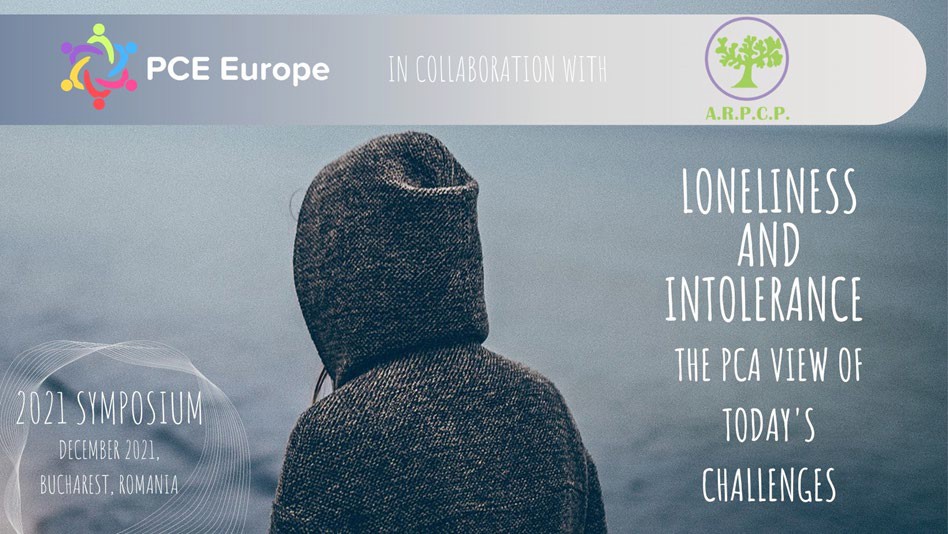
Timetable
The 4th Symposium of PCE Europe
Pre – Symposium, Symposium, Post – Symposium
Pre – Symposium
Thursday, December 2nd
Round Table
15.00 – 16.30 EET
Pre – Symposium: Ethics in Practice and Research
16.30 – 17.00 Coffee – Break
Pre – Symposium Research
17.00 – 19.00 EET
Workshop
Jo Hilton: „Telling Our Stories – Re(storying), Re(searching) and Re(discovering) ”
Friday, December 3rd
10.00 – 12.00 EET
Workshop, Part 1
Manu Bazzano: „How to make Love to Your Data:
A short course on Post-qualitative Research and the Person-Centred Approach”
12.00 – 12.30 EET Coffee – Break
12.30 – 14.00 EET
Workshop, Part 2
Manu Bazzano: „How to make Love to Your Data:
A short course on Post-qualitative Research and the Person-Centred Approach”
Symposium
Friday, December 3rd
15:00 – 16.00 EET Opening
16.00 –18.00 EET
Keynote
Lore Korbei: „We are One Event?!” The Process from I to we and the other way around within ourselves”
18.00 – 18.30 EET Coffee-Break
18.30 – 19.30 EET
The 20th ARPCP Anniversary
19.30 – 21.30 EET
Encounter Group
Leonore Langner, Arina Dogaru: PCE Encounter Group on the Theme of the Symposium
Saturday, December 4th
10.00 – 12.00 EET
Keynote
Sheila Haugh: „We’re a Little Planet with a Lot of Hope”
12.00 – 12.30 EET Coffee-Break
12.30 – 14.00 EET
Keynote
Mick Cooper: Person-Centred Counselling for Young People in Schools: Results from a Large Scale Randomised Controlled Trial
14.00 – 15.00 EET Lunch Break
15.00 -16.30 EET
Workshop
Dion Van Werde: „Pre-Therapy and Working with moments of contact loss”
16.30– 17.00 EET Coffee – Break
17.00 – 19.00 EET
Workshop 1
Lore Korbei, Joachim Sauer: Focusing and Dreams – Zoom 1
17.00 – 19.00 EET
Workshop 2
Sophia Balamoutsou: Exploring the development of a collaborative research database – Zoom 2
19.30 – 21.30 EET
Surprise!
Sunday, December 5th
10.00 – 12.00 EET
Keynote
Greet Vanaerschot: „Loneliness and Intolerance: Social Phenomena or Unmet Basic Needs?”
12.00 – 12.30 EET Coffee Break
12.30 – 13.30 EET
Lecture
Manu Bazzano: „Solitude, Interdependence, and the PCA” – Zoom 1
12.30 – 13.30 EET
Lecture
Jean-Marc Randin: „Resentment: when the conflict begins (and can be solved) – Zoom 2
13.30 – 14.30 EET Lunch Break
14.30 – 15.30 EET
Lecture
Marc Alexander Dreßler, & Stephen Joseph: A look at the Introjected Values of Neoliberal Capitalism. The Development of the Neoliberal-Capitalist Ideology Scale (NCIS) -Zoom 1
14.30 – 15.30 EET
Lecture
Veniamin Kolpachnikov (Russia): Actualizing and Self-actualizing Tendencies in Modern Human – Zoom 2
15.30 – 16.30 EET
Closing Ceremony
Post – Symposium
Monday, December 6th
10.00 – 11.30 EEC
Workshop 1, part 1
Leonore Langner: „Making Contact – Pre-Therapy in Person-Centred Practice”
11.30 – 12.00 EEC Coffee Break
12.00 – 13.30 EEC
Workshop 1, part 2
Leonore Langner: „Making Contact – Pre-Therapy in Person-Centred Practice”
13.30 – 15.00 EEC Lunch Break
15.00 – 16.30 EEC
Workshop 2, part 1
Dion Van Werde „Pre-Therapy and Working with moments of contact loss”
16.30 – 17.00 EEC Coffee Break
17.00 – 18.30 EEC
Workshop 2, part 2
Dion Van Werde „Pre-Therapy and Working with moments of contact loss”
Keynotes:
(3 December – 5 December)
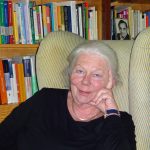 ✓ Lore Korbei
✓ Lore Korbei
„We are One Event?!”
The Process from I to we and the other way around
In the 1966 discussion with P. Tillich, C.R. Rogers stated that the human being is „hopeless social”, that he/she has a deeply rooted longing for relations.
E.T. Gendlin kept repeating that the preferred species for the human being is the human being, a fact also well known in the development of the child. And he made clear that we are living bodies in continuous exchange, continous interaction with, i.e. one event.
But distinctions are to be made for the sake of „understanding” each other- including our intolerance and aggression.Both, Rogers and Gendlin, agreed on the idea that the most personal is the most universal, both acknowledged the radical subjectivity of the individual. With this preamble – what are the implications for and what are the challenges of our daily psychotherapeutical work – as well in this pandemic situation?
Bio
Lore Korbei, DSA, MSC
Person-Centred Psychotherapist in Vienna since 1986, supervisor and trainer (ÖGWG) since 1996; Focusing coordinator for Austria nominated at the Focusing Institute New York since 2001.
Article in several relevant books and magazines: for supervision, different psychotherapeutical methods: encounter, dreams and focusing, Person-Centred including Focusing.
 ✓ Sheila Haugh
✓ Sheila Haugh
„We’re a Little Planet with a Lot of Hope”
Pictures from space show how beautiful our planet looks compared to those we can see around us. The colours of greens, yellows, blues and whites of our land, oceans and atmosphere create iconic pictures of planet earth that linger in our memory. We whirl around in a dark, cold space with no certain knowledge of any life existing other than our own. Down on planet earth we have been living through unprecedented times; times that have separated us from each other. We have experienced uncertainty and fear and many of us have experienced loss. Unsurprisingly, the pandemic has found many of us sometimes lonely, fearful and intolerant of the other. At the same time, the pandemic has shown us to be altruistic and concerned for the other. Many acts of concern and support are seen and applauded; millions and millions of other small acts of support and kindness go unreported and unnoticed other than by those whose lives are impacted and saved by these acts.
In this keynote I will present a view that the organising principle of the formative tendency helps us find a place in the universe and how we might view our progress and future as a species. I will consider how, on the micro level, the actualising tendency equips us individually and as a group to respond to the world we find ourselves facing. The challenge of today in the face of loneliness, intolerance, pandemic and climate crisis is how we meet the coming decades with a realistic hope that brings energy and commitment.
Bio
Sheila Haugh is a person-centred therapist, supervisor and facilitator. A previous Chair of the British Association for the Person-Centred Approach and board member of the World Association for Person-Centered and Experiential Psychotherapies (WAPCEP). She is the author of a number of papers, has co-edited bookson person-centred theory and practice and most recently updated Learning and Being in Person-Centred Counselling (2020) by Tony Merry.
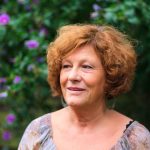 ✓ Greet Vanaerschot
✓ Greet Vanaerschot
„Loneliness and Intolerance: Social Phenomena or Unmet Basic Needs?”
Are loneliness and intolerance social phenomena associated with a changing, more individualistic society? Or are they expressions of basic human needs that haven’t been met yet?
Is loneliness related to a lack of social contact? Or can you also feel lonely with a lot of friends around you? And what about intolerance? Is it increasing in our society? Is this related to lack of empathy for our fellow human beings? If so, what makes people lose their empathy for each other? I would like to address these questions in my lecture. If we better understand what loneliness and intolerance mean and which factors play a role in these, we can also better explore this with our clients and help them to find ways to connect more with others and with themselves.
Bio
Greet Vanaerschot, PhD., is clinical psychologist and person-centered experiential psychotherapist. She is professor of psychotherapy and coordinator of the psychotherapy training programs at the University of Antwerp, Belgium, and chief lecturer at the RINO psychotherapy training programs in Utrecht, The Netherlands. She also works in private practice.
She published a lot of articles and chapters in books on person-centered and experiential psychotherapy, is one of the editors of the Dutch Handbook on person-centered and experiential psychotherapy (Lietaer, G., Vanaerschot, G.,Snijders, J.A., & Takens, R.J., 2008); and chief editor of the Dutch books Empathy, the secret weapon of psychiatrists and psychologists(Vanaerschot, G., Nicolai, N., & Hebbrecht, M., 2015) and Supervision as a process (Vanaerschot, G., Nicolai, N., & Daansen, P., 2021).

✓Mick Cooper: Person-Centred Counselling for Young People in Schools: Results from a Large Scale Randomised Controlled Trial
The ETHOS study (Effectiveness and Cost Effectiveness Trial of School-based Humanistic Counselling) was the first ‘fully-powered’ randomised controlled trial of person-centred counselling for young people. It was conducted in the UK and led by Professor Mick Cooper with a team from across the UK. The study took place in 18 London schools with 13-16 year olds (n=329). We found that, on average, person-centred counselling brought about small reductions in psychological distress, with effects that persisted for at least three months after the end of counselling. The counselling was most effective in helping young people improve their self-esteem and achieve personal goals; least effective at reducing mental health symptoms and improving educational outcomes. Such averages, however, mask differences in the way that young people responded to the counselling: around two-thirds seem to have found it wholly or mostly helpful, another 30% or so found it helped a bit; and approximately 5% really did not like it. Although there is no clear evidence on whom it was most helpful for, our interview data suggest that if young people were wanting—and motivated—to get things off their chests, learn about themselves, and/or find different ways of relating and coping, the person-centred counselling may have been most likely of benefit. On the other hand, if the young people found it difficult to open up, felt uncomfortable talking to others, and/or wanted direct guidance and advice, then the person-centred intervention did not seem to be most suited. This talk will present an overview of the ETHOS study and findings, and consider the implications for person-centred work with young people.
Mick Cooper is Professor of Counselling Psychology at the University of Roehampton, where he is Director of the Centre for Research in Social and psychological Transformation (CREST). Mick is a chartered psychologist, a UKCP-registered existential psychotherapist, and a Fellow of the British Association for Counselling and Psychotherapy. Mick is author and editor of a range of texts on person-centred, existential, and relational approaches to therapy; including Working at Relational Depth in Counselling and Psychotherapy (2nd ed., Sage, 2018, with Dave Mearns), Pluralistic Counselling and Psychotherapy(Sage, 2011, with John McLeod), and Integrating Counselling and Psychotherapy: Directionality, Synergy, and Social Change (Sage, 2019). Mick has led a series of research studies—both qualitative and quantitative—exploring the processes and outcomes of humanistic counselling with young people, and has published in a range of leading international psychotherapy journals. Mick’s latest book is Personalizing psychotherapy: Assessing and accommodating client preferences (2021, APA, with John Norcross). Mick is the father of four children and lives in Brighton on the south coast of England.
Pre-Symposium
(2 December)
 ✓ Manu Bazzano
✓ Manu Bazzano
„How to make Love to Your Data:
A short course on Post-qualitative Research and the Person-Centred Approach”
Despite their considerable differences, both quantitative and qualitative research now operate within the positivist paradigm which now governs the world of psychotherapy. Both methods fall short in capturing and embodying the intricacies, complexities and multiplicities of organismic human experience. This short course will provide participants with the knowledge and the tools to explore a third, nascent (non)modality: post-qualitative research, a mode of inquiry which draws on post-structuralism and Critical Theory and applies some of these ideas to psychotherapy, in particular to person-centred and experiential therapies.
The course will be experiential, theoretical and will include writing exercises. Participants are invited to bring one particular topic of research they wish to explore.
Bio
Manu Bazzano, PhD., is an author, psychotherapist/supervisor in private practice and an internationally recognized lecturer and facilitator. Among his books: Re-Visioning Existential Therapy (2020) Nietzsche and Psychotherapy (2019); Re-visioning Person-centred Therapy (2018); Zen and Therapy (2017) Therapy and the Counter-tradition (2016); After Mindfulness (2014); Spectre of the Stranger (2012); Buddha is Dead (2006);. He has been co-editor of Person-Centred and Experiential Psychotherapies Journal and is associate editor of Self & Society – Journal of Humanistic Psychology.
 ✓ Jo Hilton
✓ Jo Hilton
„Telling Our Stories – Re(storying), Re(searching) and Re(discovering) ”
Counselling and psychotherapy are forms of practice that rely on the experience of communicating our story to another person, whether we do that in our words, in our silences, in pictures or in the way that we use our body. We find ways of symbolising our emotions, desires and needs, and those aspects of the world, whether they be ideas, rules or living things that we hold dear.
When we story our world, search and discover, we are doing the work of the re(searcher). When we restrict our curiosity to topics that can be squashed into numerical tables, or restricted to subjects that we feel comfortable in sharing, we might be missing something of value.
This session is about giving ourselves permission to be open to a wide range of forms of research and to enquire how that might make a contribution to learning. We’ll trouble the ways in which we can conceptualise power within research, and consider how we might strengthen those voices (including our own) that can easily remain unheard.
We’ll look at some of the history of ‘truth claims’ – how different ways of conducting research have contributed to the wider pool of learning in different ways. We’ll look at what is expected of us when we move from what we might see as the simple act of telling our story into an autoethnography, or when a piece of writing becomes ‘writing as a form of enquiry’. We’ll also look at re-claiming the ‘case study’ and how a case study can make a difference.
There will be a chance to work together, with short, focusedpresentations alongside time to share thoughts and ideas in small groups.
Bio
Jo Hilton has a background in the arts, largely as someone interested in giving artists the chance to do what they do best. After training in the field of counselling and psychotherapy, she recognised the power of stories in the way we live our lives. Most recently, she has been working with students at the University of Edinburgh as they become the counsellors and researchers of the future.
Post-Symposium
(6 December)
 ✓ Workshop with Leonore Langner
✓ Workshop with Leonore Langner
„Making Contact – Pre-Therapy in Person-Centred Practice”
The first of Rogers’ six „necessary and sufficient conditions” is that two people are „in contact”. In most psychotherapies, this point goes almost unnoticed as a self-evident basic prerequisite.
But what if my client has a limited ability to engage in contact? They may be severely demented, have emotional or cognitive limitations? How is person-centred practise even possible?
With Pre-therapy, Garry Prouty has shown a person-centred way to relate effectively to severely impaired clients.
This workshop offers insights into Pre-therapeutic theories and experiences in engaging with people whose perceptual possibilities lie outside the norm.
Using case studies, we will look at the manifold possibilities and the associated difficulties of establishing contact.
Bio
Leonore Langner BA, Person-centred psychotherapist, group psychotherapist, counsellor, supervisor and sound therapist, working in private practice in around Vienna, Austria.
Chair of PCE Europe and trainer at Peter Hess Academy (Austrian Institute for Sound-Massage-Therapy).
For many years I have offered therapy in geriatric and palliative care units, Pre-Therapy and nonverbal methods with clients in persistent vegetative state.
Workshops and lectures.
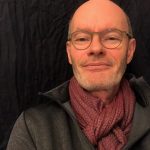 ✓ Dion Van Werde
✓ Dion Van Werde
„Pre-Therapy and Working with moments of contact loss”
The main aspects of Pre-therapy will be presented again: contact, pre-expressive functioning, reflections of contact, existential alienation, etc. In this workshop, more time will be invested in working interactionally with the participants. Depending on which questions the participants bring, role playing, demonstrating and supervision of practice examples can be offered.
Especially „working in the grey zone“ will be addressed. This is about how to proceed when during a session, all of a sudden the contact with the client gets lost, and the client seems to disappear in an own world that seems unreachable, uncomprehensible, and maybe even bizar.
Bio
Dion Van Werde:
Belgian clinical Psychologist M.A. / Person Centered (PC) Psychotherapist, now living and working in Germany.
Supervisor of the Flemish Association for PC /Experiential Psychotherapy and Counselling. Member of the editorial board of the World Organization for PC / Experiential Psychotherapy.
Certified Trainer and Coordinator of the Pre-Therapy International Network. Trained by Prouty in Chicago, USA. He publishes on Pre-Therapy (see: www.pre-therapy.com under “references”), trains and supervises practitioners and teams, and gives lectures and workshops in 4 languages.
Worked for over 30 years in residential psychiatry in Belgium, with people suffering psychotic functioning, where he and his team translated Prouty’s Pre-Therapy into a multidisciplinary therapeutic ward milieu. Now living in Germany, working in an occupational rehabilitation service for people with multiple problems.
Contact: dionysius.vanwerde@gmail.com, Tel.: 0049 1788872743
Lectures and workshops
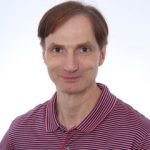 ✓ Jean-Marc Randin, psychologist, client-centered psychotherapist and trainer, living in Lausanne, Switzerland.
✓ Jean-Marc Randin, psychologist, client-centered psychotherapist and trainer, living in Lausanne, Switzerland.
„Resentment: when the conflict begins (and can be solved) within ourselves”
The reflection I want to develop here has its roots in my work both as client-centred psychotherapist and as facilitator in encounter groups. In these groups people often try to better understand human relationships and its obstacles through an exploration of themselves at a deep level.
Conflicts at home, at work, with members of one’s family and so on are often realities that people in therapy are trying to solve. While doing so, they have to discover and understand where it comes from.
My point will be to show how much, in these personal situations, hate and resentment are not due to what someone has been exposed in a painful situation, even if this person has really been treated badly. These feelings come from inside the person, i.e. we are creating resentment within
ourselves, and we are responsible for it.
In the psycho-social field, there is a strong tendency to consider a person who has experienced a trauma mostly as a victim. I’d like to argue that this view is counter-productive. I prefer to consider the person who has experienced a trauma as doing something to cope with the strain. It
is what he or she does with it that is the real issue. It can develop hate towards the perpetrator(s), but it does not have to.
I intend to show the process in which change can happen when someone is stuck in the status of being a victim that “cannot do anything”.
 ✓ Manu Bazzano
✓ Manu Bazzano
„Solitude, Interdependence, and the PCA”
There appear to be two fundamental longings in human beings: the first one is the yearning for relatedness and meaningful interaction, dialogue, and connection; the second longing is for space, solitude, and autonomy, the desire to satisfy our equally powerful need for separateness and individuality. Arguably, all human love and dialogue is an attempt to reconcile these two equally important longings and attain ‘constancy’. How can this reconciliation be achieved in life as in therapy at times of crisis and global challenges?
 ✓ Dion Van Werde
✓ Dion Van Werde
Pre-Therapy
„Pre-Therapy“, a person centered way of offering reconnection.
In this workshop, Dion will present Pre-Therapy as developed by Dr. Garry Prouty (1936-2009).
He will situate Prouty in the world of Person-Centered Psychotherapy, and will demonstrate this way of working with people who are out-of-contact due to reasons of e.g. psychosis, mental handicap combined with mental problems, onset of dementia or moments of contact loss in an ongoing psychotherapy or counselling.
In Pre-Therapy, „contact“ and „pre-expressive functioning“ are key concepts. They help to define a framework in which all unusual, out-of-contact, so called „symptomatic“ behavior (as in psychosis e.g.), is seen as meaningfull and is taken as a starting point for empowering interaction.
The phenomenological method of giving „reflections“ means to empathically name and describe the common reality present, in a very concrete and non-directive way. This kind of contact work invites the person who is imprisoned in his/her ideosyncratic world and suffering from it, to reconnect again with the surrounding world, to get in touch with his/her feelings, and relate to others in a socially understandable way.
Coming out of the isolated reality by increased awareness, means more contact-functioning and vice versa. This results in the step from pre-expressive to expressive functioning. Contact is re-established.
Contact proves to be reconnection, being an antidote to existential alienation.

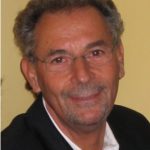 ✓ Lore Korbei (Vienna), Joachim Sauer (Salzburg)
✓ Lore Korbei (Vienna), Joachim Sauer (Salzburg)
Workshop
Focusing and Dreams
The late Rogers accentuated the creativity of dreams, Gendlin book „Let your body interpret your dreams” was edited in 1986. Working with dreams is opening new perspectives and therfore a new way of being with yourself and others. After a short theoretical introduction, we want to emphasize the practical side with demonstrations.
The accent will be laid on our ”Dark Sides”, the one not so accessible to us during day time.
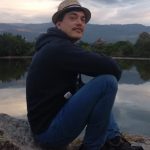
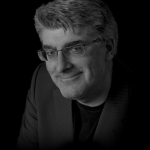 ✓ A look at the Introjected Values of Neoliberal Capitalism. The Development of the Neoliberal-Capitalist Ideology Scale (NCIS).
✓ A look at the Introjected Values of Neoliberal Capitalism. The Development of the Neoliberal-Capitalist Ideology Scale (NCIS).
Marc Alexander Dreßler, & Stephen Joseph
School of Education, University of Nottingham
In current research on causes of “mental disorders”, there is a great emphasis on the individualisation of human suffering. Systemic reasons for human suffering seem to receive a marginal interest. The PCA view challenges this emphasis: The solution to psychopathology means creating a much more accepting and empathic social environment (Bohart, 2017). Instead of being intolerant to individual differences and blaming the individual for its own suffering, the causes for “psychopathology” are located in conditions of worth (Rogers, 1959).
This paper investigates if the neoliberal capitalist system, with neoliberalism as its ideological core, and capitalism as the structural force, might be creating conditions of worth. For this purpose, a neoliberal-capitalist ideology scale (NCIS) was developed. In an online questionnaire, 156 participants completed both the NCIS and the Authenticity Scale (Wood et al., 2008). Participants who scored highly on the NCIS also scored significantly higher on the self-alienation subscale of the Authenticity Scale. No significant associations were observed between the NCIS and the two other subscales, Accepting External Influences, and Authentic Living. This might be an indication that neoliberal-capitalism is indeed a condition of worth hindering us from accessing our intrapsychic processes, especially those Bohart termed “self-organizing wisdom” (Bohart, 2017). This self-alienation would be a cause of loneliness and intolerance itself. It is an isolation from our true selves and an intolerance towards ways of being which differ from the ideals of neoliberal-capitalist ideology. It might be important for us psychotherapists, especially person-centred therapists, to look at the influence of neoliberal-capitalist ideology on our clients, but more importantly on us. A therapist’s congruence is one of the necessary and sufficient conditions of therapeutic personality change (Rogers, 1957). If we are alienated from ourselves, we might be perpetuating neoliberal-capitalist conditions of worth.
References
Bohart, A. C. (2017). A client-centered perspective on ‘psychopathology’. Person-Centered & Experiential Psychotherapies, 16, 1, pp. 14-26.
Rogers, C. R. (1957). The Necessary and Sufficient Conditions of Therapeutic Change. Journal of Consulting Psychology, 21, pp.95-103.
Rogers, C. R. (1959). A theory of therapy, personality, and interpersonal relationships, as developed in the client-centered framework. In: Koch, S. (Ed.) (1959). Psychology: A study of a science, study 1, volume 3. New York: McGraw-Hill, pp. 184-256.
Wood, A. M., Linley, P. A., Maltby, J., Baliousis, M., & Joseph, S. (2008). The Authentic Personality: A Theoretical and Empirical Conceptualization and the Development of the Authenticity Scale. Journal of Counseling Psychology, 55, 3, pp. 385–399.
PCE Encounter Group on the Theme of the Symposium
The association PCE Europe, the patron of the symposium, is currently in the process of living up to the name „network” – in the spirit of this networking, the PCE Encounter Group was recently founded. With this, we want to provide a framework that facilitates contact and exchange among our international colleagues. Giving our members the possibility to get to know each other on an individual and deeper level in a more personal way we hope that bridges can be built from person to person, even across national borders.
Our special approach offers encounter groups as a powerful opportunity in these difficult times by enabling contact as a valuable resource.
This is what this symposium is all about.
The PCE Encounter Group would like to do this actively by meeting for the first time not only online, but face to face (if the Symposium can take place face to face) and by dealing with the theme of the symposium „Loneliness and Intolerance”.
Organising team of the Encounter Group during the Symposium:
 Leonore Langner BA, APG•IPS, Austria
Leonore Langner BA, APG•IPS, Austria
Person-centred psychotherapist, group psychotherapist, counsellor, supervisor and sound therapist, working in private practice in around Vienna, Austria.
Workshops and lectures. Chair of PCE Europe.
 Arina Dogaru, ARPCP, Romania
Arina Dogaru, ARPCP, Romania
Person-centred psychotherapist, clinical psychologist, group psychotherapist and Encounter enthusiast.
I work in Bucharest (Romania), while staying in touch with the international community and being involved in projects and organizations that bring us together, such as PCE Europe and the Encounter group it proposes.
Workshop
 ✓Sophia Balamoutsou:Exploring the development of a collaborative research database
✓Sophia Balamoutsou:Exploring the development of a collaborative research database
Words: research, collaboration, open source, shared
Affiliation: Chair of the Scientific Committee, World Association of Person Centredand Experiential Psychotherapy and Counselling,
Topic/Question: How can we cultivate a collaborative and open sharing about how we conduct research?
During the PCE2018 conference of the World Association for Person-Centered and Experiential Psychotherapy and Counselling in Vienna, it was proposed to develop a research database as part of PCE literature database (https://pce-literature.org/). It was thought as an open source and a free space where research articles, methods, protocols, and projects can be shared and become accessible, with academics, trainers, practitioners as well as service users and the general public.
Format for the workshop:
The literature and research website will be introduced with some short videos explaining how entries can be added to the research database. The research database will be presented with some examples of the type of information that could be stored there. We will have the opportunity to discuss possibilities and ideas and the future potential of the database and hopefully cultivate interest in contributing to the project.
The aspiration for this project is that it will cultivate more active collaboration between researchers, practitioners, trainers and service users. We hope it will encourage discussion and debate about how research is conducted, as well as greater transparency about the methods used to generate research findings. This can be seen as an example of making research a shared endeavor in the community and embracing a situated and negotiated approach to research findings rather than these being a static truth.
Short bio
Sophia Balamoutsou is currently the Chair of the Scientific Committee of WAPCEPC. She is an Accredited Member of the British Association of Counselling and Psychotherapy (MBACP) and an Associate Fellow of the British Psychological Society (AFBPsS). She was a lecturer and taught research and counseling for a number of years in Britain (University of Worlverhampton, University of Chester, UK). Currently she lives and works in Greece, she has a private practice and is a part time lecture at the Institute for Counselling and Psychological Studies.
Degree: MA, PhD
Specialization: research, trauma, personal development, supervision
Email: sofiabalamoutsou@gmail.com
Lecture
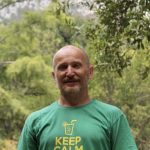 ✓Veniamin Kolpachnikov: Actualizing and Self-actualizing Tendencies in Modern Human
✓Veniamin Kolpachnikov: Actualizing and Self-actualizing Tendencies in Modern Human
The concepts of “actualizing tendency” and “self-actualizing tendency” constitute a core of theory of personality and theory of fully functioning person in the Person-Centered Approach.
Based on distinction of the two tendencies, their connection and difference, I will illustrate both situations of their coherence/correspondence and conflict/controversy to each other in life and activity of contemporary human.
Some phenomena (such as “conforming”, partial perceiving, self-deception, hatred, as well as internal consent, commitment, “activity beyond situation”, spiritedness, co-actualizing, over individual unity, etc.) will be described and illustrated.
This knowledge might be of use both in practice of counselling/psychotherapy and research of modern human.
